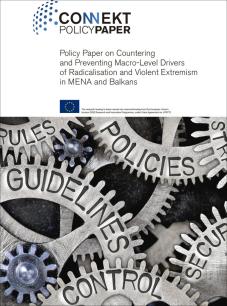Policy Brief on Macro-Level Drivers of Radicalisation and Violent Extremism in MENA and Balkans

Despite latter attention given to the legal instruments designed to tackle radicalisation and violent extremism (VE), current policies on preventing and countering violent extremism (P/CVE) draw upon security approaches and an overemphasis on religion as a driver; prescribe young people as passive victims of any external influence or indoctrination and mainly focus on the association between individual trajectories and radicalisation. The identification of these elements as explanatory factors driving VE, besides presenting limited evidence, contributes to the stigmatisation of certain communities as shelters for radicals and potential terrorists. Such assumptions disregard the premise that it is the combination of several drivers in a determinate setting which can further explain what encourages citizens to engage in violence. This policy brief is based on empirical research carried out in Tunisia, Morocco, Jordan, North Macedonia, Bosnia and Herzegovina (BiH), Kosovo and Bulgaria. Both this paper and previous research have been conducted within the framework of the EU-funded H2020 Project CONNEKT (CONtexts of extremism iN mEna and balKan socieTies).